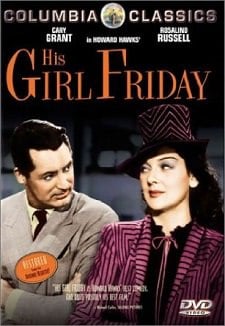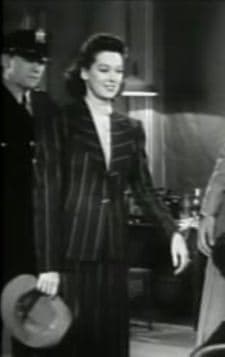This post may contain affiliate links and Corporette® may earn commissions for purchases made through links in this post. As an Amazon Associate, I earn from qualifying purchases.

Ladies — did you get a chance to watch the movie His Girl Friday? This is part three in our series on “working girl” movies; you can check out our earlier discussion of the movies 9 to 5 and Working Girl. (You can stream it for free on Amazon Prime if you haven’t.)
I hadn’t seen this movie in a few years, and I was interested to see it again for this discussion — I’m a big fan of Cary Grant (my youngest son’s middle name is Grant because of him) and director Howard Hawks, and while I haven’t seen a ton of Rosalind Russell’s work this movie has made her beloved to me. There are obvious parts of the 1940 movie that don’t translate well to 2016, such as a few intolerant lines, but I still thought it was interesting to watch. Some notes, in no particular order:
I love the entire premise of this movie — that she loves her job and the thrill of reporting more than her super boring but handsome fiance who can promise her the life of a “human being,” aka a suburban SAHM. (Ralph Bellamy, who plays her fiance, was a very popular leading man back in the day and, at the time of the movie, casting him was to cast quite a ‘catch.’ He had a huge career — I always remember his much later role in Trading Places but he was also in Pretty Woman.)
I love that scene where the newspapermen read Hildy’s draft when she isn’t there and all recognize what a good writer she is. It’s funny to think this was a 1940 movie — they looked to her as their equal throughout the movie, and growing up I never questioned the idea that women were equal to men, or that men would question their equality/intelligence/competency, in part because of screwball comedies like this one.
It’s interesting to contrast that to the 1980 movie 9 to 5 — where women were being chased around the desk — or the 1988 movie Working Girl, where she’s alone in the room negotiating with a sea of men.
I guess one way of understanding it is to think that Hildy, in 1940, represented a star, a shining example of what women could become — whereas in 1989 there was some weariness over the fact that women had to be an absolute star to stand out over the sea of men.
I’m particularly curious to hear from you guys, though — particularly those of you who grew up with all of these movies, as I did — how do you interpret the progress or lack thereof made by women in the intervening years? Did you internalize a different message from the different movies?
This movie is one of the classic examples of the “fast-talking dame” — it’s even on the cover of the 2003 book all about the movement. From the book description on Amazon:
Coming of age during the Depression, the dame–a woman of lively wit and brash speech–epitomized a new style of self-reliant, articulate womanhood. Dames were quick on the uptake and hardly ever downbeat. They seemed to know what to say and when to say it. In their fast and breezy talk seemed to lie the secret of happiness, but also the key to reality.
A note on fashion: hooray for women’s indoor hats going away — let’s hope that trend stays gone; I wasn’t a fan of any of the hats.

Hildy doesn’t have many outfits in the movie — she spends most of the movie wearing that crazily-striped number from the movie poster (which may or may not have been purple, as pictured above) before she switches into a more subdued (but still a bit crazy) pinstriped number.
You may think, MY, how garish — but there’s a scene where one of the male reporters is looking out the window with Cary Grant and from the close-up on his suit you can see that the pattern there was also slightly crazy. So: crazy prints! Not just for chicks! (I’ll try to find a screenshot if I can of his suit.)s
I’ve studied this movie in a few different contexts, including the journalism one — I’ll spare you the details, but by way of explanation, it IS interesting that this was before the “watchdog,” “unbiased” era of journalism, back when each major city had a Democratic and Republican newspaper. (Unfortunately I don’t have a book on journalism history handy right now to check it — here’s a link to the Wikipedia page about how newspapers were strongly tied to political parties for much of the country’s history.)
As much as I love the movie (and Cary Grant), the ending of it grated with me this time, where he makes her carry her own suitcase out of the room and she sounds so dazzled that she gets to marry him (again).
A few choice quotes:
- Hildy: “Walter, you’re wonderful, in a loathsome sort of way…”
- Hildy: “Scram, Svengali…”
- Hildy: “Yeah, he should make some girl real happy… slap happy…”
- Walter: “Take Hitler and stick him on the funny pages! … No, no, leave the rooster story, that’s human interest.”
Ladies, what are your thoughts — if you’d seen it before, how did it hold up for you? If this was your first watching, did you like it? What are your thoughts on the way working women were depicted differently in 1940 vs. 1980, 1988, and then movies of today?

Anony
I haven’t seen this movie but you’re making me want to watch it!
Cat
Oh it’s fabulous. Perfect for a cozy Saturday in. I recommend an early dinner followed by this movie, wine, and blankets.
I kind of don’t want to pick this one apart because I think it’s so fun. Kind of like reading for English class — no faster way to ruin the pure joy of reading!
AIMS
Love this movie. Also like Switching Channels with Burt Reynolds, Kathleen Turner and Christopher Reeve , which is basically a remake but set in the cable news world. Love that both heroines here basically reject the traditional goals women are supposed to strive for.
A lot of movies of this era had successful women protagonists. I was watching Miracle on 34th Street not that long ago and Maureen O’Hara (?) plays a very successful executive and there is no issue with her being a woman whatsoever. I wonder how much of that is just a construct to set the plot in motion? Did audiences just view it the same way that we might view a Bond girl who is also a nuclear physicist?
Ellen
I think it is great. Women who are NOT subjugated into roles where they just play cute and dumb. I wish real life was as easy as the movies. Women in the movies could tell a guy to get lost, and did NOT have to worry about sexueal harassment. In real life, it is NOT as easy for us. DOUBEL FOOEY!
Anon
Re: progress made by women- I think it’s important to note the date, 1940, when women were needed in the workplace during WWII. I think the big backlash came in the late 40’s and 50’s when men came home from the war and needed those jobs back.
CBW
This has absolutely nothing to do with the movie, but the title brought back some fond memories. Right out of law school, I clerked for a female state appellate judge whom I still consider my mentor. Sometimes she would need help with non-job related tasks, i.e., fixing her computer, helping her design mugs, picking out presents for the other judges on the court, etc., that I was more than happy to help her with because it meant more face time with her. My desk was right outside her office, so if she needed to speak with me regarding a case I was working on, she would call me by name. If she needed my help with anything else, she would call me “Girl Friday” and I knew what the task would be. It became the ultimate inside joke between us!
CS
Note that this movie was adapted from a stage play called “The Front Page” in which Hildy Johnson is a man. The original is primarily about how the press reacts to/creates the news.
Anonymous
Another thing to consider about films from the time period with, if not necessarily feminist at least, well rounded female characters is that there used to be many more female screen writers during the studio era. Most were women married to make screen writers and they worked as a team (and got paid more than a single writer, though not double). But screenplays weren’t written, pitched and sold like they are now — an executive would come up with an idea and then someone working at the studio would create a script. At the time continuity editors were women and referred to as “script girls” (supposedly the female eye for detail made them better at it than men) and some of these women did become screen writers. Nowadays there are virtually no female screen writers. Even something like Sex and the City had an almost entirely male writers’ room.